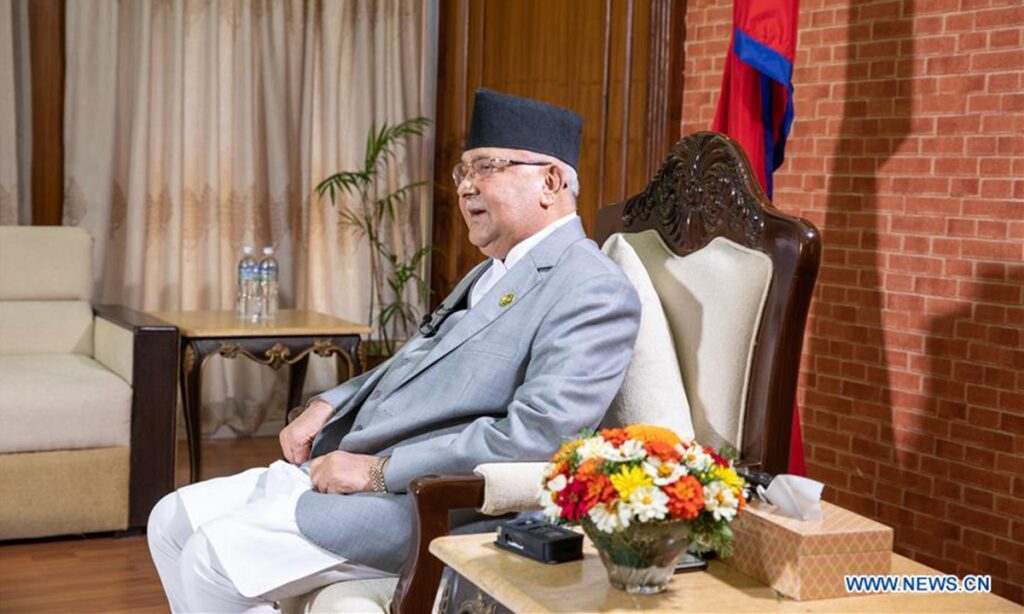The state government is also in turmoil and internal preparations are underway to dissolve the state assembly.
After receiving information that the Dahal-Nepal faction was going to bring a no-confidence motion against Oli pro-chief minister, Prime Minister KP Oli said that the state assembly would also be dissolved if a no-confidence motion was brought against his pro-chief ministers. The Prime Minister said this while talking to his team in Baluwatar while the third meeting of the Central Committee of the NCP was underway. There is a constitutional provision that a no-confidence motion can be brought against a state government like the Center and the Chief Minister should be removed if he fails to prove a majority.
Speaking to senior journalist Jivaram Bhandari during a television interview yesterday, the PM said: “During this period, it is appropriate to go along with the status quo, wherever it is, at the state or local level. Otherwise, if they take action, I will have to take further steps.” The PM’s statement has been viewed with the issue of dissolving the state assembly. Currently, Oli has four Chief Minister out of the seven states. Currently, the chief ministers in Province 1, Bagmati, Gandaki and Lumbini are the leaders of pro Oli.
Article 232 of the constitution provides for the dissolution of the state assembly. Article 232, Clause 3 states, “In case of any act which seriously affects the sovereignty, geographical integrity, nationality or independence of Nepal in any province, the President may alert the Provincial Council of Ministers as necessary, suspend for a maximum of six months or dissolve the Provincial Council of Ministers and Provincial Assembly.’ It is feared that the Prime Minister may recommend to the President to dissolve the state assembly through this constitutional provision.
Clause 4 of the same article of the constitution states that in case of suspension or dissolution of a provincial council of ministers and the provincial assembly, such act must be approved by a majority of the total number of members of the federal parliament within 35 days and if approved by the federal parliament then the election will be held within the period of 6 months.
However, if the provincial union intervenes, the central parliament will not be able to approve it.
Article 168, Clause 7 of the Constitution of Nepal mentions the natural process of dissolution of the Provincial Assembly.
Under this section, if the five different initiatives to form a government like at the center are not successful, the state assembly can be dissolved as a sixth option.
Earlier, Prime Minister Oli had said that the state government was an administrative unit of the Federal Government. During a meeting with party leaders in Karnali on October 17, the prime minister said: ‘the state government was an administrative unit of the Federal Government.’ It cannot make any important decisions on its own. There you cannot make or remove any minister yourself. Those things should be done only after the Prime Minister says so, after discussions in the party, only after taking instructions from the leadership, so be careful in such matters.’
The split of the ruling Communist Party of Nepal (NCP) has also put the state governments in crisis. The NCP-led government in provinces 1, Bagmati, Gandaki, Lumbini and Karnali are in the minority.
Apart from Karnali, four other governments are led by Prime Minister KP Oli pro-leaders. In the Far West, Chairman Prachanda and Madhav Nepal’s side Trilochan Bhatt is the Chief Ministers. He is still in a comfortable majority.
It is almost certain that the post will be lost of Chief Minister of State 1 Sherdhan Rai if there is no cooperation between the two divided NCP in running the government. The NCP has 67 MPs in the 93-member state assembly. Of these, 47 are in favor of Chairman Prachanda and Nepal and 20 are in favor of Prime Minister Oli, i.e. Chief Minister Rai. Even if he joins other parties, including the main opposition Congress, Rai will not be able to get a majority of 47 MPs. There are 21 MPs from the Congress, three from the Janata Samajwadi Party and one each from the RPP and the Federal Democratic Forum in the state assembly.
The post of Bagmati Chief Minister Dormani Poudel is also in a trap. The NCP has 80 MPs in the 110-member state assembly. Of them, 46 are in favor of Prachanda-Nepal and 34 only in favor of Oli. In such a situation, 22 MPs are needed to get a majority for Chief Minister Poudel. If Poudel can take help with the Congress, he will be able to get a majority. There are 22 Congress MPs, three from the Vibekshil Saja Dal, two each from RPP and NPLP and one independent. Meanwhile, the Prachanda-Nepal faction will also need the Congress to lead the government by removing Chief Minister Poudel. This faction needs 10 MPs to get a majority for the lead. Gandaki Chief Minister Prithvi Subba Gurung, who is also losing the majority. However, he can save the government even if he only gets the support of the Congress or smaller parties. The NCP has 40 members in the 60-member state assembly. Of them, only 13 are from the Prachanda-Nepal faction, 27 are from the Oli faction, i.e. Chief Minister Gurung. He needs four MPs to maintain a majority. There are 15 Congress MPs, three Rastriya Janamorcha MPs and two JSP MPs in the state assembly. The Prachanda-Nepal faction has to form a government with the Congress and two other smaller parties.
Federal Home Minister Ram Bahadur Thapa Badal’s group has three open MPs in the state assembly. The Oli group has claimed that they are on their side. However, Minister for Internal Affairs and Law Hari Bahadur Chuman, who is considered close to Badal, said that all the three were in the Prachanda-Nepal group. Lumbini Chief Minister Shankar Pokharel is also in the minority due to the party split. He seems to be needed the help of the Congress to save the government.
The NCP has 61 MPs in the 87-member state assembly. There are 35 MPs from the side of Prime Minister Oli, i.e. Chief Minister Pokharel, and 26 MPs from the side of another Chairman Prachanda-Nepal side. Similarly, there are 19 Congress MPs, six Janata Samajwadi Party MPs and one Janamorcha MP. Oli on Tuesday nominated four lawmakers from the then UML-elected Prachanda-Nepal faction as central members, adding to the impact of the party split on the state government. Home Minister Ram Bahadur Thapa camp’s two MPs are not clear yet. Wherever the Badal go, they are expected to go along with him. Chief Minister Pokharel needs nine MPs to secure a majority. In such a case, he has to take the support of the Congress.
The party believes that if Badal supports Oli, the two lawmakers close to him will also be in favor of Pokhrel. In such a situation, Pokhrel will be able to lead the government with the help of JSP and Janamorcha MPs. Karnali Chief Minister Mahendra Bahadur Shahi is also in the minority. The NCP has 33 MPs out of 40 in the state assembly. Of them, 19 are from Prachanda-Nepal faction and 14 from Oli faction. Till two days ago, there were 21 MPs in favor of Prachanda-Nepal. However, after Oli nominated two lawmakers to the Central Committee on Tuesday, the chief minister Shahi fell into the minority. There are six Congress MPs and one RPP MP in the state assembly. The split in the party does not seem to affect the far-western government, because out of 39 MPs of the NCP, four have been seen in Oli’s side so far. However, this group estimates that one or two more may increase due to Lekhraj Bhatt. There are 12 Congress MPs and two JSP MPs in the state assembly.



